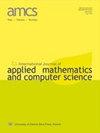Towards a Health–Aware Fault Tolerant Control of Complex Systems: A Vehicle Fleet Case
IF 1.2
4区 计算机科学
Q3 AUTOMATION & CONTROL SYSTEMS
International Journal of Applied Mathematics and Computer Science
Pub Date : 2022-12-01
DOI:10.34768/amcs-2022-0043
引用次数: 3
Abstract
Abstract The paper deals with the problem of health-aware fault-tolerant control of a vehicle fleet. In particular, the development process starts with providing the description of the process along with a suitable Internet-of-Things platform, which enables appropriate communication within the vehicle fleet. It also indicates the transportation tasks to the designated drivers and makes it possible to measure their realization times. The second stage pertains to the description of the analytical model of the transportation system, which is obtained with the max-plus algebra. Since the vehicle fleet is composed of heavy duty machines, it is crucial to monitor and analyze the degradation of their selected mechanical components. In particular, the components considered are ball bearings, which are employed in almost every mechanical transportation system. Thus, a fuzzy logic Takagi–Sugeno approach capable of assessing their time-to-failure is proposed. This information is utilized in the last stage, which boils down to health-aware and fault-tolerant control of the vehicle fleet. In particular, it aims at balancing the exploitation of the vehicles in such a way as to maximize they average time-to-failure. Moreover, the fault-tolerance is attained by balancing the use of particular vehicles in such a way as to minimize the effect of possible transportation delays within the system. Finally, the effectiveness of the proposed approach is validated using selected simulation scenarios involving vehicle-based transportation tasks.面向健康感知的复杂系统容错控制:一个车队案例
摘要研究了车队健康感知容错控制问题。特别是,开发过程首先提供流程描述以及合适的物联网平台,从而实现车队内部的适当通信。它还向指定的司机指示运输任务,并使测量他们的实现时间成为可能。第二阶段是运输系统解析模型的描述,该模型是用max-plus代数得到的。由于车队由重型机械组成,因此对其所选机械部件的退化进行监测和分析至关重要。特别是,考虑的部件是滚珠轴承,几乎在每个机械运输系统中都有使用。因此,提出了一种能够评估其失效时间的模糊逻辑方法。这些信息在最后一个阶段被利用,这可以归结为车队的健康感知和容错控制。特别是,它旨在平衡车辆的利用,使其平均不发生故障的时间最大化。此外,容错性是通过平衡特定车辆的使用来实现的,以使系统内可能的运输延误的影响最小化。最后,通过车辆运输任务的仿真场景验证了所提方法的有效性。
本文章由计算机程序翻译,如有差异,请以英文原文为准。
求助全文
约1分钟内获得全文
求助全文
来源期刊
CiteScore
4.10
自引率
21.10%
发文量
0
审稿时长
4.2 months
期刊介绍:
The International Journal of Applied Mathematics and Computer Science is a quarterly published in Poland since 1991 by the University of Zielona Góra in partnership with De Gruyter Poland (Sciendo) and Lubuskie Scientific Society, under the auspices of the Committee on Automatic Control and Robotics of the Polish Academy of Sciences.
The journal strives to meet the demand for the presentation of interdisciplinary research in various fields related to control theory, applied mathematics, scientific computing and computer science. In particular, it publishes high quality original research results in the following areas:
-modern control theory and practice-
artificial intelligence methods and their applications-
applied mathematics and mathematical optimisation techniques-
mathematical methods in engineering, computer science, and biology.

 求助内容:
求助内容: 应助结果提醒方式:
应助结果提醒方式:


